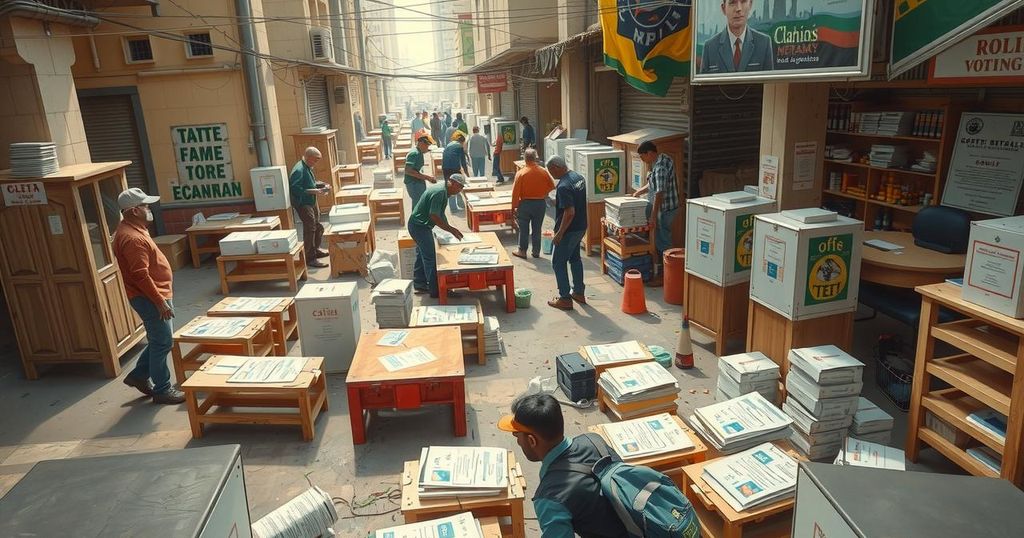Philippines Election Highlights Marcos-Duterte Feud Amid Security Concerns

In the Philippines, millions are set to vote in a pivotal mid-term election amid tensions between President Ferdinand Marcos and impeached Vice President Sara Duterte. With critical Senate positions at stake ahead of a potential impeachment trial for Duterte, this election could shape the political future leading to the 2028 presidential race. Security concerns arise with reports of election-related violence as well.
Filipinos are gearing up for a crucial mid-term election on Monday, with the ongoing feud between President Ferdinand Marcos and his impeached Vice President Sara Duterte taking the spotlight. This election could serve as a referendum on their contentious relationship, as citizens prepare to choose from over 18,000 positions, including seats in the House of Representatives and various municipal offices. But much attention is directed at the Senate race, given its implications for the 2028 presidential election.
The outcome of the election will determine 12 Senate seats, which will play a significant role in an upcoming impeachment trial for Vice President Duterte, slated for July. It is reported that should she be convicted, she could face a permanent barring from holding public office. The feud intensified this past February when Duterte was impeached for alleged “high crimes,” including charges of corruption and a supposed plot against Marcos.
Adding further tension, just weeks after the impeachment, Sara Duterte’s father, former President Rodrigo Duterte, was arrested and transferred to The Hague to face charges of crimes against humanity linked to his controversial drug campaign. In order to hold onto any future presidential hopes, Duterte will need to secure at least nine out of the 24 available Senate votes in this election.
As the election draws near, a split in candidate endorsements has emerged: seven candidates in the top twelve were backed by President Marcos, while four aligned with the vice president. Interestingly, two candidates, including Imee Marcos—who is the president’s sister—were recently adopted as honorary members of Duterte’s party, PDP-Laban. This move seems aimed at consolidating support for the Vice President ahead of her impeachment trial.
At a final rally in Manila, Sara Duterte hinted at fears of “massive” electoral fraud, reiterating her belief that her father’s ICC transfer was akin to a “kidnapping.” Despite his arrest, former President Duterte remains a candidate for mayor in Davao City, where he is looking to regain his previous position and is expected to do well according to local polls.
In the lead-up to the election, national police have heightened their alertness, deploying around 163,000 officers to secure polling locations and assist election officials. Additional personnel from various agencies are on standby to ensure public safety amidst the volatile nature of elections in the Philippines, known for its instances of violence over contested provincial roles.
Tragically, at least 16 individuals, including a city council hopeful and candidates, have lost their lives in violent incidents ahead of the election. Most notably, Saturday saw a candidate for municipal councillor killed during a shootout involving police and military in a region notorious for election-related violence. Additionally, security forces apprehended a group at the Cebu airport while they were attempting to transport nearly $8 million in cash—a violation of election regulations intended to curb vote-buying practices.
These developments lead into what is undoubtedly going to be a defining election for the Philippines, one which pits two of the country’s most notable political figures against each other amid a backdrop of violence and uncertainty.
The Philippine mid-term elections promise significant ramifications, particularly concerning the political futures of President Ferdinand Marcos and Vice President Sara Duterte. With campaign tensions high and allegations of electoral fraud looming, the dynamics of this electoral process play a critical role in shaping the nation’s political landscape leading up to the 2028 presidential election. The fear of violence, evidenced by recent tragic events, also poses a serious challenge to the integrity and safety of the electoral process.
Original Source: sg.news.yahoo.com








